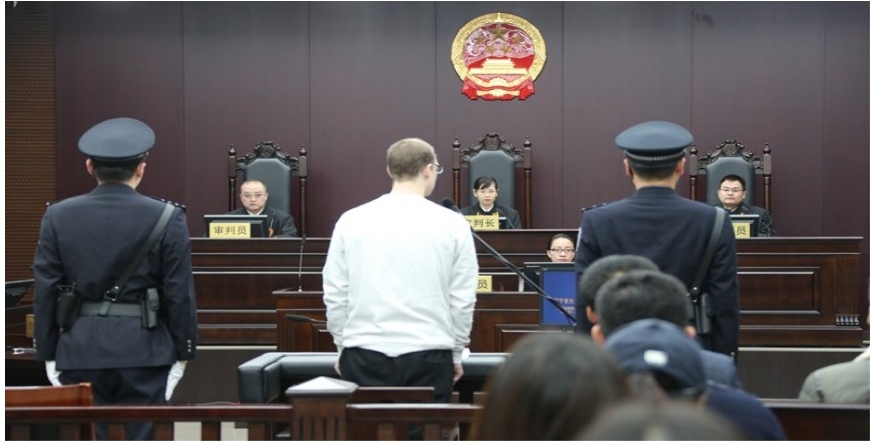Chinese court upholds Canadian drug smuggler’s death penalty

Canadian drug smuggler Robert Lloyd Schellenberg attends the court at the Intermediate People’s Court of Dalian in Northwest China’s Liaoning Province.
By
Cao Siqi
Canadian drug smuggler Robert Lloyd Schellenberg’s death penalty was upheld by the High People’s Court of Liaoning Province on Tuesday in a second trial. The case has won broad support from the Chinese public, as they detest drug trafficking and believe mercy to drug dealers would equal infringement on the rights of millions of Chinese people.
The court in the second trial rejected Schellenberg’s appeal, upheld the original first judgment, and reported the death sentence to China’s Supreme People’s Court for approval in accordance with the law, according to a statement published on the court’s website on Tuesday.
In Schellenberg’s first trial at the Intermediate People’s Court of Dalian in November 2018, he was sentenced 15 years in jail for smuggling 222.035 kilograms of meth. The Dalian court held a retrial of the case on January 15, 2019 as prosecutors presented new evidence which showed that Schellenberg was not only the prime culprit of drug smuggling but was also engaged in organized international drug trafficking, and he was sentenced to death by the Dalian court.
According to China’s Criminal Procedure Law, the court of the original trial may change the penalty when the prosecutors provide new evidence.
Pei Zhaobin, dean of the law school of Dalian Ocean University who attended the retrial, told the Global Times that the prosecutors provided evidence to prove Schellenberg participated in organized international drug trafficking as a prime culprit.
The evidence constitutes new criminal facts, which means that the verdict does not violate the principle, Pei said.
Pei stressed that the death penalty verdict is legal and appropriate, reflecting the determination and intensity of China’s crackdown on drugs.
After the retrial, Schellenberg appealed. The Canadian Ambassador to China rejected the verdict, saying “We condemn the verdict in the strongest possible terms and call on China to grant Robert clemency,” according to CNBC. He also criticized the penalty as “cruel and inhumane.”
The High People’s Court of Liaoning said it formed a collegial panel in accordance with the law, held a public session to try the case, and concluded that “the facts identified in the first trial were clear, the evidence was true and sufficient, the conviction was accurate, the sentence was appropriate and the trial procedure was legal.”
The court said during the second trial that it guaranteed the rights of Schellenberg in accordance with the law to defend himself and to participate in the proceedings in his own language, and listened to his own defense with the assistance of two translators.
The case, along with two other cases involving two separate Canadians who were charged with stealing state secrets from China, was interpreted by some Western media as an effort by China to step up pressure on Canada to release Huawei’s Meng Wanzhou.
Dominic Barton, Canada’s Ambassador to China, told CNBC that he doesn’t think it’s a coincidence these are happening right now while events are going on in Vancouver, and the case was “part of the geopolitical process of what is happening.”
Chinese Embassy in Canada on Tuesday condemned Ottawa’s statement on the death penalty, saying it seriously violates China’s judicial sovereignty and the spirit of the rule of law. China will never allow drug traffickers from any country to kill and poison the Chinese people, the embassy said. The law is not a game, and China urges Canada to be cautious with words and actions and stop making irresponsible remarks.
“The death penalty has been widely applied in the world based on international laws. Canada should respect China’s laws and drop the illusion that the drug smuggler would be granted some mercy due to his nationality,” Wang Yiwei, director of the institute of international affairs at the Renmin University of China in Beijing, told the Global Times on Tuesday.
“The case has nothing to do with the Meng Wanzhou case,” Wang stressed.
According to Wang, Meng’s case is a completely political incident. Canada has arbitrarily detained Meng for more than two years, and she is an innocent Chinese citizen who violated no Canadian law at all. Canada is acting as an accomplice of the US, so Meng’s case is “arbitrary detention.”
“The verdict of Schellenberg shows China has always been open, transparent and principled in diplomacy. Any judicial decision does not target any country and Canada should never think of attacking and restraining China with legal cases,” Wang said.




